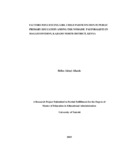| dc.description.abstract | The purpose of this study was to determine the factors influencing participation of girl-child in public primary education among the nomadic pastoralists in Magadi division, Kajiado north sub-county, Kenya. It particularly focused on the importance of girl-child education, community sensitization by the head teacher, head teachers‟ administrative experience, parental income and influence of FGM. This research was based on Classical Liberal Theory of Equal Opportunity which affirms that each person is born with a given amount of capacity, which to an extent is inherited and cannot be substantially changed. The conceptual framework was intended to assist the researcher develop awareness and understanding of the situation under scrutiny and communicate it. The investigation was conducted using the descriptive survey design which describes respondents‟ characteristics such as abilities, opinions, attitudes, beliefs and/or knowledge. Questionnaires were used for data collection. The semi structured questionnaire was used for the head teachers, teachers and pupils. The design of the instruments was informed by the objectives and the research questions of the study. The study yielded both qualitative and quantitative data. Quantitative results of data analysis were presented mainly in tables. The study was to establish the level to which the head teachers‟ administrative experience influenced girl-child participation in public primary education. The study revealed that head teachers who had taught between 6 to 20 years were 60% while the others who had taught for over 20 years were 40%. Head teachers must recognize that they have the capacity and power to make key decisions which affect the participation of girls in education. The findings also established that there is need for both the classroom teachers and the subject teachers to motivate girls in their classrooms for successful participation in primary education. Besides, it was established that inadequate or lack of materials posed a great challenge to teachers from implementation of quality participation in education. The study recommended that public primary schools should be equipped with adequate resources and facilities for all children especially girls to fill several gaps that still exist. Besides, teachers need to be trained again through in-service courses to be empowered with unique skills to handle girls who are already in school and to bring in those who are not. Head teachers should be on the forefront to ensure re-entry and repetition policies are implemented in school. Given the scope and limitations of this study, the researcher recommends a replica of the study to be performed in other public primary schools in ASAL areas in Kenya to establish the variant challenges in the girl-child participation in primary education. | en_US |

